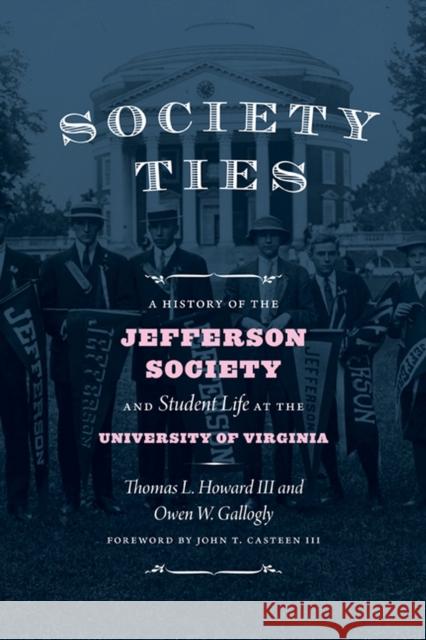Society Ties: A History of the Jefferson Society and Student Life at the University of Virginia » książka
Society Ties: A History of the Jefferson Society and Student Life at the University of Virginia
ISBN-13: 9780813939810 / Angielski / Twarda / 2017 / 392 str.
Society Ties: A History of the Jefferson Society and Student Life at the University of Virginia
ISBN-13: 9780813939810 / Angielski / Twarda / 2017 / 392 str.
(netto: 108,42 VAT: 5%)
Najniższa cena z 30 dni: 113,53
ok. 16-18 dni roboczych
Dostawa w 2026 r.
Darmowa dostawa!
Society Ties is a history of the University of Virginia's oldest student organization, the Jefferson Society. Founded in 1825, the Society has counted the likes of Woodrow Wilson and Edgar Allan Poe among its membership and continues to be one of the largest and most active student organizations on Grounds. Society Ties is more than just the story of the Jefferson Society, however; it is a history of student life at the University of Virginia. The book explores what motivates students during their time at the University and how they experience the ineffable place that is Jefferson's Academical Village. Although there is a growing body of scholarship on the history of the University, little attention has been paid to student life, with a focus instead on administrative and institutional developments. The Jefferson Society has received less attention still--though similar groups at other institutions have received significant historical treatment--largely because no historian has until now been granted access to the Society's archives. Society Ties addresses both of these gaps, recounting in unique depth and vibrancy the history of the University from a student perspective. Generations of students have passed through Hotel C on the West Range and gone on to be statesmen, writers, and intellectuals. Society Ties offers fresh insight into how these students' formative experiences shaped their later impact on the world. It tells the stories of young orators practicing at politics, aspiring authors setting their pens to the pages of magazines and newspapers in pursuit of the beauty of the written word, young men grappling with the questions of integration and coeducation, and why even today students gather, as they have for almost two hundred years, on West Range to discuss the important issues of the day. Society Ties also comes at a critical time in the study of the history of American higher education, as the legacy of our academic institutions come under increasing scrutiny. Questions about the role of race, gender, and privilege in higher education underscore our obligation to enhance our understanding of this rich history. This book seeks to do just that.











